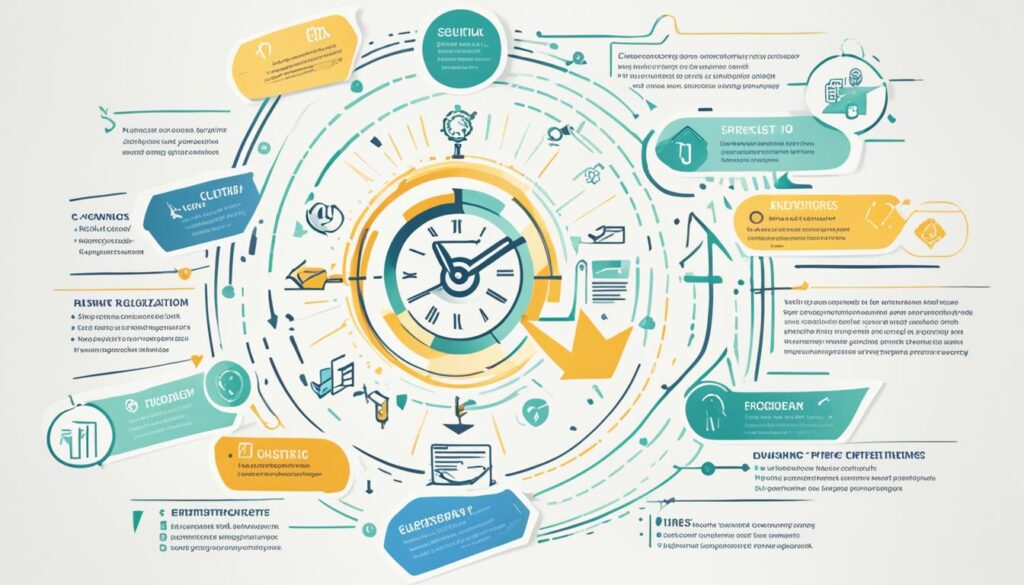Unlock Your Potential: Improving Time Management

Do you often find yourself running out of time or feeling overwhelmed with your workload? Are you searching for ways to enhance your productivity and accomplish more in your personal and professional life? If so, it’s time to unlock your potential by improving your time management skills.
In this article, we will explore practical strategies and expert advice to help you prioritize tasks, increase efficiency, and make the most of your precious time. By adopting these time management tips, you can transform the way you work and achieve your goals with ease.
Key Takeaways:
- Define your priorities and align your daily activities accordingly.
- Implement the 80/20 rule to focus on tasks that yield the greatest results.
- Create a daily plan with a prioritized to-do list.
- Leverage time-blocking techniques to allocate dedicated periods for specific tasks.
- Practice effective task management by utilizing the two-minute rule, setting deadlines, and delegating tasks when necessary.
Define Your Priorities
To improve time management, it is crucial to define your priorities and align them with your long-term goals. By identifying what truly matters to you, you can focus your energy and attention on tasks that contribute to your overall objectives. This enables you to make significant progress in both your personal and professional life.
To begin, take a moment to reflect on your aspirations and what you hope to achieve. Consider what brings you fulfillment and happiness. Whether it’s excelling in your career, maintaining strong relationships, or pursuing personal growth, understanding your long-term goals will guide your day-to-day decisions.
Once you have a clear picture of your priorities, it becomes easier to prioritize tasks. When faced with multiple obligations and distractions, remind yourself of your overarching goals. Ask yourself: “Will this task support my long-term objectives?” If the answer is no, consider whether it truly deserves your time and attention.
For example, instead of mindlessly scrolling through social media feeds, dedicate that time to completing important work projects that align with your goals. By consciously choosing where to invest your time, you can ensure that each day brings you closer to achieving your aspirations.
Remember, defining your priorities is not a one-time exercise. As your goals evolve and circumstances change, it is important to revisit and adjust your priorities accordingly. Regularly assess your progress and make any necessary modifications to keep your time aligned with your long-term vision.
By defining your priorities and aligning your daily activities accordingly, you can effectively utilize each moment to make progress towards your goals.
Examples of Priorities and Goal Alignment:
| Priorities | Long-Term Goals |
|---|---|
| Career advancement | Become a senior manager within five years |
| Family and relationships | Create a strong and loving family environment |
| Personal health and well-being | Achieve physical fitness and mental balance |
| Personal growth and development | Learn a new language or acquire a new skill |

Embrace the 80/20 Rule
Implementing the 80/20 rule, also known as the Pareto Principle, can greatly improve time management. This rule suggests focusing on the tasks that will yield the greatest results and impact. By dedicating your energy to the 20% of tasks that contribute to 80% of your desired outcomes, you can prioritize your efforts and maximize your productivity.
When applying the 80/20 rule, it’s important to identify the tasks that align with your desired outcomes and deliver the most significant value. Consider the following steps to effectively embrace this rule:
- Identify your key goals:
- Analyze task impact:
- Delegate or eliminate non-essential tasks:
- Organize your time:
- Regularly review and adjust:
Take the time to identify your key goals and desired outcomes. This will provide clarity on which tasks hold the most importance in achieving your objectives.
Assess the impact of each task on your desired outcomes. Determine which tasks contribute the most to your goals and focus on these high-impact activities.
Delegate or eliminate tasks that do not align with your desired outcomes or have a low impact on achieving your goals. This will free up your time to concentrate on the tasks that yield the greatest results.
Allocate dedicated time blocks to focus on the tasks that have the highest impact. Prioritize these tasks and ensure that you dedicate your energy to completing them.
Regularly review your tasks and outcomes to ensure they are aligned with your goals. Adjust your focus as needed and monitor your progress to stay on track.

The 80/20 rule allows you to channel your efforts towards the tasks that will bring you the most significant outcomes. By focusing on these key activities, you can optimize your time management, increase your productivity, and achieve your desired results.
Create a Daily Plan
Start each day by creating a prioritized to-do list or schedule. Break down larger tasks into smaller, manageable chunks. Allocate specific time blocks for focused work, meetings, and personal activities. By having a clear plan in place, you can stay organized and ensure that your time is utilized effectively.

Creating a daily plan is an essential step in effective time management. It provides structure and guidance, helping you prioritize tasks and stay focused throughout the day. By following a well-organized plan, you can maximize productivity, accomplish more, and avoid feeling overwhelmed.
| Benefits of a Daily Plan | Tips for Creating a Daily Plan |
|---|---|
|
|
Leverage Time-Blocking Techniques
Implementing effective time-blocking techniques is a powerful way to optimize your productivity and focus on what truly matters. By allocating dedicated periods for specific tasks, you can minimize distractions and make the most of your valuable time. With careful planning and deliberate action, you can achieve remarkable results.
One popular time-blocking strategy is to schedule uninterrupted periods for deep work. This involves setting aside focused work sessions where you can dive into your most critical projects without distractions. For example, consider blocking off two hours each morning to concentrate solely on high-priority tasks. During this time, eliminate all unnecessary interruptions and immerse yourself in meaningful work.
By structuring your time in this way, you create a dedicated space for focused and uninterrupted work. You can immerse yourself completely in the task at hand, allowing for greater concentration, creativity, and productivity. Time-blocking helps you prioritize your work and ensures that important tasks don’t get overshadowed by less impactful activities.
Take a moment to imagine the impact of dedicating uninterrupted time to your top-priority projects. Picture yourself fully engaged and completely focused, making significant progress towards your goals. Time-blocking brings this vision to life, enabling you to accomplish tasks more efficiently and with greater attention to detail.
Benefits of Time-Blocking:
- Enhanced focus and concentration
- Increased productivity and efficiency
- Improved task prioritization
- Reduced stress and overwhelm
- Better work-life balance
When time-blocked effectively, your workdays become highly structured, allowing you to minimize distractions and optimize your output. By creating a clear plan and adhering to it, you gain a sense of control over your time and tasks. This sense of control fosters motivation and drives you to accomplish more than you thought possible.
Unlock your potential and harness the power of time-blocking techniques. Embrace focused work sessions and witness the incredible impact they can have on your productivity and overall success.
| Time-Blocking Tips | Benefits |
|---|---|
| Avoid multitasking | Enhanced focus and attention to detail |
| Set clear goals for each time block | Improved task prioritization and productivity |
| Minimize external distractions | Reduced interruptions and increased efficiency |
| Take short breaks between time blocks | Improved mental sharpness and sustained productivity |
| Review and adjust your time-blocking schedule regularly | Continuous optimization and adaptation |
Practice Effective Task Management
When it comes to effective time management, practicing efficient task management strategies is essential. By implementing the two-minute rule, setting realistic deadlines, and delegating tasks, you can optimize your workload and make the most of your valuable time.
Adopt the Two-Minute Rule
Do you often find yourself procrastinating on small tasks? The two-minute rule can help overcome this challenge. If a task can be completed in two minutes or less, do it immediately. By taking immediate action, you can prevent these quick tasks from piling up and consuming more of your time later on.
Set Realistic Deadlines
Deadlines are crucial for maintaining focus and ensuring timely completion of tasks. When setting deadlines, it’s important to be realistic and consider the complexity and duration of each task. Break down larger projects into smaller milestones, each with its own deadline. This approach allows you to track progress and stay motivated as you achieve these smaller goals along the way.
Delegate Tasks to Free Up Time
No one can do everything alone. Identifying tasks that can be delegated to others or outsourced is an effective way to free up your time and focus on more critical responsibilities. Delegating tasks not only lightens your workload but also allows others to contribute their skills and expertise. By engaging in effective task delegation, you can optimize productivity and create opportunities for growth within your team.
By implementing these task management strategies, you can take control of your workload, stay on top of deadlines, and maximize your productivity.
| Task Management | Benefits |
|---|---|
| Adopting the two-minute rule | – Prevents small tasks from accumulating – Saves time in the long run |
| Setting realistic deadlines | – Maintains focus and motivation – Provides a clear timeline for completion |
| Delegating tasks | – Frees up time for more important responsibilities – Encourages collaboration and growth |

Conclusion
Improving time management is a transformative skill that empowers you to make the most of each day. By defining your priorities, utilizing time-blocking techniques, and practicing effective task management, you can unlock your productivity potential. Embrace technology tools, take strategic breaks, learn to say no, and continuously reflect on your time management practices to further enhance your efficiency. With effective time management, you can accomplish more, reduce stress, and create a fulfilling balance in your personal and professional life.
By effectively managing your time, you can experience numerous benefits. Increased productivity allows you to accomplish tasks in a timely manner, enabling you to move closer to achieving your goals. With better time management, you have the opportunity to prioritize your work and focus on what truly matters, ensuring that your efforts align with your long-term objectives. This sense of direction and clarity creates a greater sense of fulfillment and satisfaction, as you make progress towards your desired outcomes.
In addition to boosting productivity and achieving goals, effective time management reduces stress and improves your overall well-being. By optimizing your time, you can minimize procrastination and stress-induced decision-making. It allows for greater work-life balance, enabling you to dedicate quality time to your personal relationships, hobbies, and self-care. Through efficient time management, you create a harmonious synergy between your personal and professional life, leading to increased contentment and overall life satisfaction.
FAQ
Why is effective time management important?
Effective time management is crucial for maximizing productivity and achieving success in all aspects of life. It allows you to prioritize tasks, increase efficiency, and make the most of your valuable time.
How can I define my priorities and long-term goals?
Take the time to clearly define what matters most to you and align your daily activities accordingly. This will help you prioritize completing important work projects over non-essential tasks, ensuring that your time is focused on tasks that contribute to your overall goals.
What is the 80/20 rule and how can it improve time management?
The 80/20 rule, also known as the Pareto Principle, suggests focusing on the tasks that will yield the greatest results and impact. By dedicating your energy to the 20% of tasks that contribute to 80% of your desired outcomes, you can prioritize your efforts and maximize your productivity.
How can I create a daily plan to improve time management?
Start each day by creating a prioritized to-do list or schedule. Break down larger tasks into smaller, manageable chunks. Allocate specific time blocks for focused work, meetings, and personal activities. Having a clear plan in place will keep you organized and ensure that your time is utilized effectively.
What are time-blocking techniques and how can they be leveraged?
Time-blocking involves allocating dedicated periods for specific tasks, such as scheduling uninterrupted time for deep work and minimizing distractions. By structuring your time and eliminating unnecessary interruptions, you can enhance your productivity and accomplish tasks more efficiently.
What is the two-minute rule and how can it be used for effective task management?
The two-minute rule states that if a task can be done in two minutes or less, you should do it immediately. Setting realistic deadlines for your tasks, breaking down larger projects into smaller milestones, and identifying tasks that can be delegated or outsourced are also effective task management strategies.
What are the benefits of improving time management?
Improving time management is a transformative skill that empowers you to make the most of each day. It allows you to accomplish more, reduce stress, and create a fulfilling balance in your personal and professional life.






